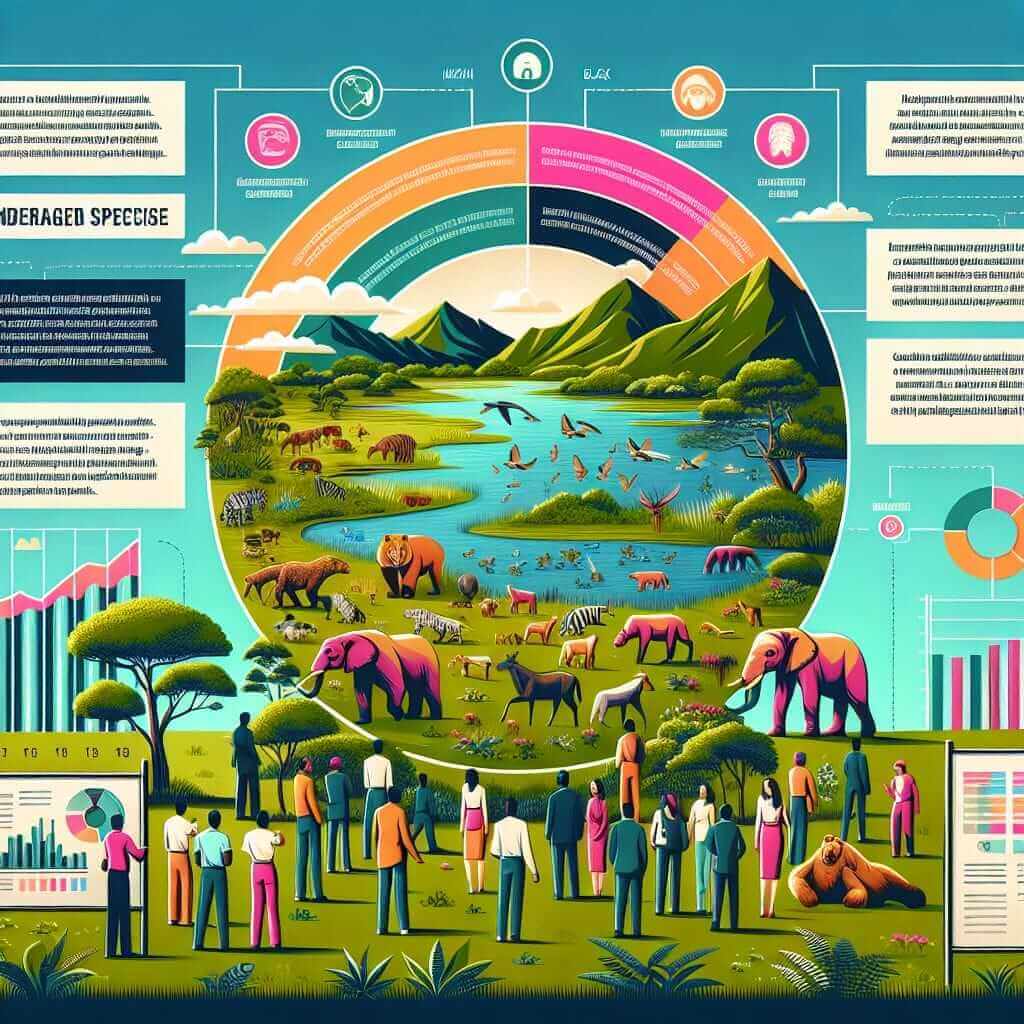The responsibility of protecting endangered species is a critical issue that has been frequently discussed in the IELTS Writing Task 2. Because of the increasing awareness of environmental conservation, this topic often appears in various versions and can range from the role of governments and communities to international cooperation efforts.
Here are some related IELTS essay topics you might encounter:
- “Some people think that governments should focus more on protecting endangered species. To what extent do you agree or disagree?”
- “Discuss the role of governments in the preservation of endangered species and the environment. Give reasons for your answer and include any relevant examples from your own knowledge or experience.”
- “Many endangered species are on the brink of extinction due to human activities. What measures can be taken by governments to address this issue?”
In this article, we will focus on creating a detailed, high-quality sample essay for the following topic:
Chosen Topic for Model Essay
“Some people think that governments should focus more on protecting endangered species. To what extent do you agree or disagree?”
Parsing the Question
The task asks for your opinion on whether governments should place greater emphasis on the protection of endangered species. This requires you to present a clear thesis statement, supported by well-organized arguments and examples. A balanced approach or a clear stance (agree/disagree) should be made evident in the introduction and conclusion.
Model Essay
Introduction
The decline of biodiversity and the rapid extinction of species have reached alarming levels, propelling the role of government intervention into the spotlight. There is a growing sentiment that governments should prioritize the protection of endangered species. This essay will argue that while governmental efforts are crucial, a multifaceted approach involving various stakeholders may be more effective.
Body Paragraph 1 – Importance of Government Role
Firstly, governments have the authority and resources to implement large-scale conservation programs. Legislation targeting habitat conservation, such as the establishment of wildlife reserves, can significantly reduce threats to endangered species. For instance, many countries have enacted strict anti-poaching laws, which have been instrumental in protecting species like elephants and rhinoceroses from illicit hunting.
Body Paragraph 2 – Financial and Educational Support
Furthermore, governments can allocate substantial financial resources towards research and conservation projects. By funding scientific studies, governments can support the development of innovative techniques for breeding and reintroducing endangered species into the wild. Additionally, educational campaigns orchestrated by governments can raise public awareness about the importance of biodiversity, fostering a culture of conservation among citizens.

Body Paragraph 3 – Collaboration with NGOs and International Bodies
However, government action alone is insufficient. Collaboration with Non-Governmental Organizations (NGOs) and international bodies is essential for a holistic approach. NGOs often have specialized expertise and grassroots networks that are vital for effective on-ground action. For example, World Wildlife Fund (WWF) campaigns have successfully leveraged both governmental policy and local community efforts to protect species.
Conclusion
In conclusion, while the role of governments in protecting endangered species is undeniably significant, it should not function in isolation. A cooperative approach involving NGOs, international bodies, and the general populace will yield better and more sustainable outcomes. Therefore, I partially agree with the statement, believing that a concerted effort is the key to preserving our planet’s biodiversity.
Word count: 300 words
Key Notes for Writing
Vocabulary and Grammar Tips
- Lexical Resource: Use specialized terms like “biodiversity,” “legislation,” “conservation,” “endangered species,” and “collaboration.”
- Grammatical Range: Use complex sentences, passive voice where appropriate, and a variety of linking phrases (e.g., “Firstly,” “Furthermore,” “In conclusion”).
- Coherence and Cohesion: Each paragraph should start with a clear topic sentence and maintain a consistent format.
- Task Achievement: Fully address the topic and provide balanced arguments, if applicable.
Important Vocabulary to Remember
- Biodiversity (n.) /ˌbaɪ.oʊ.daɪˈvɜːr.sə.ti/: The variety of life in the world or in a particular habitat.
- Legislation (n.) /ˌlɛ.dʒɪsˈleɪʃ(ə)n/: Laws considered collectively.
- Conservation (n.) /ˌkɒn.səˈveɪ.ʃən/: The action of conserving something, in this case, wildlife.
- Collaboration (n.) /kəˌlæbəˈreɪʃən/: The action of working with someone to produce or create something.
- Endangered (adj.) /ɪnˈdeɪn.dʒəd/: At risk of extinction.
Conclusion and Additional Practice Topics
In sum, the government’s role in protecting endangered species is crucial but most effective when combined with efforts from NGOs and the international community. Other related topics you may practice include:
- “How effective are international organizations in combating wildlife crime?”
- “Discuss the pros and cons of zoos in preserving endangered species.”
By practicing these topics, you will be well-prepared to tackle related questions in the IELTS Writing Task 2. Remember, a balanced approach, clear organization, and use of advanced vocabulary will help achieve a higher band score.